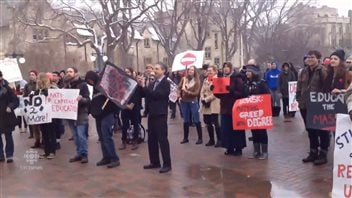Nearly half of Canada’s post-secondary students worry that they won’t have enough money to cover this coming year’s tuition and living expenses, according to a survey by CIBC, a major Canadian Bank. They also worry that they won’t be able to pay back their student debt once they have graduated.
The new school year is about to start and while some parents pay their children’s expenses, many don’t or only pay a portion. Their children are expected to work part time and, if need be, to take out a loan from the bank or government.

Tuition fees increased dramatically
At the beginning of the 1990s, average post-secondary tuition fees were $1,464, notes the Canadian Federation of Students. Today, the average fee is $5,581. The federation notes that fees went up dramatically starting in the 1980s when governments began to reduce funding to post-secondary institutions. Increases slowed across the country when students began protesting.
This year, most students expect to spend between $10,000 and $30,000 for schooling and personal expenses. They expect less help from their parents. Last year, they expected parents to cover 33 per cent of their tuition and school costs. This year, they only expect help with 22 per cent.
Finding a job a top concern
Finding a job that pays well after graduation is the top concern for 37 per cent of students. By then, 36 per cent expect to owe $25,000.
As many as 37 per cent aren’t sure they will be able to manage their finances after they finish school and 19 per cent do not expect to be able to support themselves.
‘Post-secondary education (has) become unaffordable’
“Rapidly increasing tuition fees have caused post-secondary education to become unaffordable for many low- and middle-income Canadians,” says the Canadian Federation of Students. This has sparked some student demands for free education.







For reasons beyond our control, and for an undetermined period of time, our comment section is now closed. However, our social networks remain open to your contributions.